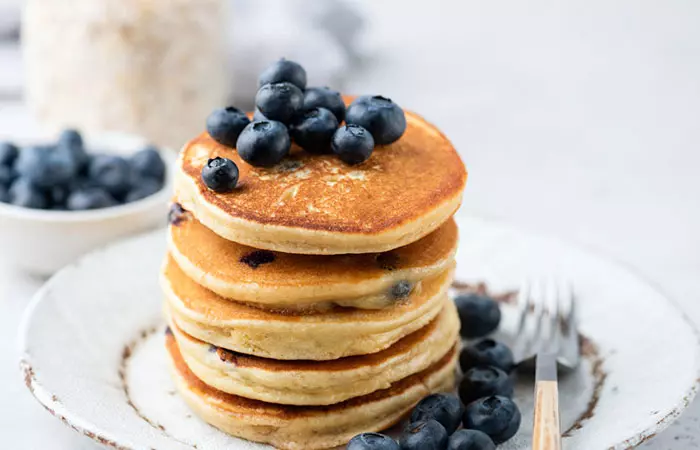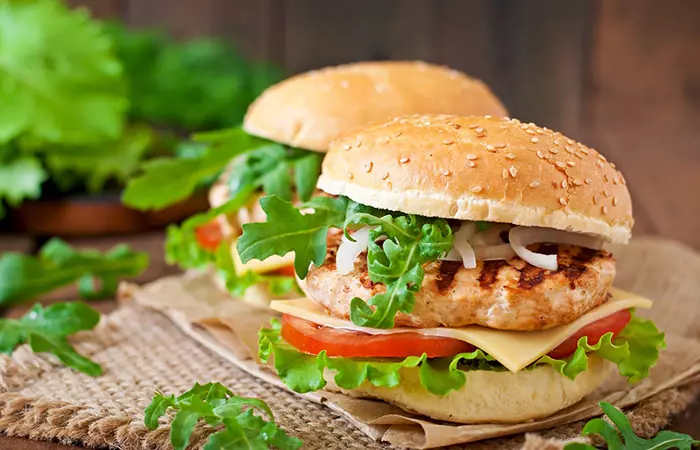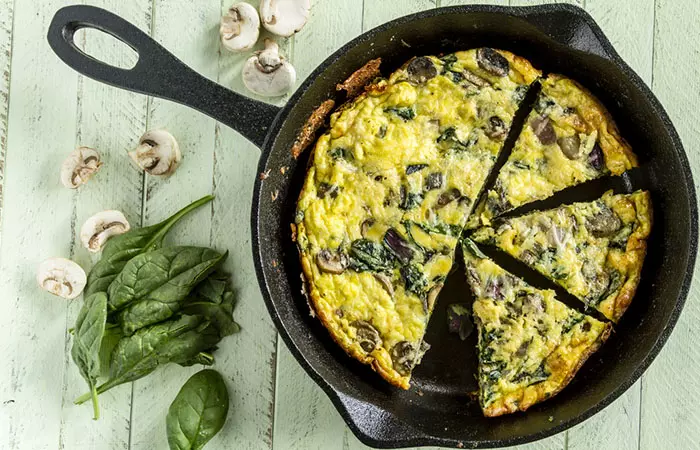What Is The MIND Diet?
MIND stands for Mediterranean-DASH Diet Intervention for Neurodegenerative Delay. This diet plan is designed to promote brain health and reduce cognitive declinei The gradual decline of cognitive abilities, such as memory, attention, and thinking. (1). It is a hybrid of the two healthy diets, the Mediterranean diet and the DASH (Dietary Approaches to Stop Hypertension) diet, and is considered one of the best and most effective diets for health and vitality. It improves heart health, reduce the risk of diabetes, and lower blood pressure (2), (3), (4). Over time, researchers integrated the key elements of both diets that seemed to have a great impact on brain health. This resulted in the MIND diet plan that includes foods that are rich in nutrients, antioxidants, and healthy fats to support brain health and reduce the risk of neurodegenerative diseases like Alzheimer’s and dementiai A range of cognitive impairments that affects a person’s thinking, memory, and ability to perform daily activities. . But, why is there so much emphasis on brain health? According to a 2022 report by the Alzheimer’s Diseasei A progressive brain disorder that slowly deteriorates cognitive skills and memory and is characterized by behavioral changes. Association, as many as 6.2 million people in the United States alone have Alzheimer’s disease (5). Evidence indicates that the MIND diet lowered the risk of this condition by 53% in participants who strictly followed it and by approximately 35% in those who practiced it moderately (6). But how does this diet plan work to boost brain health? Find out in the next section.
How Does The MIND Diet Work?
The MIND diet mainly focuses on the consumption of plant-based foods, while limiting the intake of foods high in saturated fats and added sugars. The intake of foods that are rich in essential nutrients (B vitamins, magnesium, iron), antioxidants (vitamin C, flavonoids, polyphenols), and healthy fats (omega fats) help protect and nourish the brain. Consuming nutrient-rich foods and following specific diet plans may help fight against the oxidative damage and inflammation associated with cognitive decline (7), (8), (9), (10). The antioxidants available in foods that make up these diet plans help protect the brain cells from free radical damage (11), (12). They also help prevent beta-amyloid plaque formation in the brain, which is the primary cause of brain cell death or Alzheimer’s disease (13). In addition, the omega fats in these healthy foods exhibit anti-inflammatory activity that helps lower inflammation in the brain (14), (15). The MIND diet mainly focuses on 15 dietary ingredients to eat or avoid. The following section will give you an idea of the MIND diet foods list.
Foods To Eat On The MIND Diet
The ten types of food people following this diet can eat include:
- Berries: Blueberries and strawberries are rich in flavonoids, especially anthocyanidins, that may help improve cognitive ability by reducing oxidative stress and inflammation (16), (17). Including them in your diet may help reduce, and even reverse, cognitive decline as they have antioxidant and anti-inflammatory properties. Try to eat a handful of berries at least twice a week.
- Leafy Greens: Consumption of green leafy vegetables, such as kale, spinach, and lettuce, may help slow down the decline of cognitive abilities in old age. Leafy greens are rich in vitamin K, lutein, β-carotene, nitrate, folate, kaempferol, and α-tocopherol that slow down the cognitive decline process (18). Aim to eat a minimum of 6 servings (½ cup, cooked) of leafy greens per week.
- Nuts: A study showed that people who consume more than 70 g/week of nuts had a 17% lower risk of cognitive impairment compared to non-consumers. Antioxidants, in the form of nutrients like vitamin E and non-nutrients such as polyphenols present in the nuts, can positively affect cognitive functioning (19). Consume at least five servings (30 g) of nuts such as almonds, pistachios, and walnuts per week.
- Whole Grains: Consumption of whole grains may prevent a decline in cognition (20). Whole grains are rich in non-nutrient phytochemicals like flavonoids, carotenoids, and phytosterols that play a key role in reducing cognitive decline (21). Try to include whole grains such as oatmeal, quinoa, rye, and brown rice in at least three servings (16 g) per day.
- Beans: The nutrients available in beans help improve brain function. They contain low levels of zinc, and the intake of food low in zinc may help reduce cognitive delay in the elderly (22). Include beans, such as kidney beans, black beans, and pinto beans, in at least four meals per week.
- Vegetables: The intake of vegetables is inversely associated with the prevalence of cognitive disorders. Vegetables are rich in a variety of antioxidant nutrients that act against oxidative stress and help reduce cognitive decline (23). Eat vegetables like cabbage, carrots, broccoli, and okra at least once (77 g) per day.
- Fish: A higher intake of fish is associated with a lower risk of neurodegenerative disorders like dementia (24). Fish fatty acids like EPA (eicosapentaenoic acid) and DHA (docosahexaenoic acid) are also being studied for their potential in treating Alzheimer’s disease and major depression (25). Add fish, like tuna or salmon, to your diet at least once a week.
- Poultry: A moderate intake of lean cuts of poultry (chicken) helps reduce the risk of cognitive decline. Chicken contains dietary protein and essential amino acids that may have a protective effect on cognitive functioning. Also, it may help reduce beta-amyloid deposition in the brain, which is associated with cognitive impairment (26). Eat poultry twice a week, and try having steamed or smoked meat instead of frying or grilling it. Do not over-consume poultry as it also contains saturated fats.
- Wine: Wine consumption in moderation has been associated with a reduced risk of cognitive impairment. Red wine contains flavonoids that reduce the incidence of Alzheimer’s disease and cerebrovascular disease. It also contains resveratrol, which has neuroprotective and anti-neuroinflammatory properties that may help prevent cognitive decline (27). Do not consume more than one glass a day or 30 g for men and 20 g for women.
- Olive Oil: Oleuropein-aglycone, a phenolic compound present in olive oil, has a neuroprotective effect that acts against cognitive decline and aids memory and behavioral functions (28). Use extra virgin olive oil to cook your food or as dressing for salads. The MIND diet recommends avoiding or limiting certain types of food that are believed to be less beneficial for brain health. Scroll down to learn about them.
Foods To Avoid On The MIND Diet
Here are some foods to limit on the MIND diet (29):
Fast Food (French fries, fried chicken, chicken nuggets): Limit your consumption to less than one serving (100 g) per week. Red Meat (pork, ground beef, lamb): No more than four servings (3 oz) per week. Butter: Less than one tablespoon daily. Cheese: Less than one serving (2 oz) per week. Pastries And Sweets: No more than five times per week.
Planning your meals according to your dietary requirements makes the whole process more effective. The following sample 7-day meal plan can give you a clear idea.
7-Day MIND Diet Meal Plan
This 7-day MIND diet meal plan focuses on including foods that are rich in nutrients and beneficial for brain health. This is a sample MIND diet 7-day plan you can experiment with on a daily basis to boost your cognitive health. But, does this plan also help with weight loss? Scroll down to know more.
Can I Lose Weight On The MIND Diet?
Anecdotal evidence suggests that following the MIND diet may help you lose weight. While this diet mainly boosts your brain health, the foods included in this diet are high in healthy nutrients and proteins and low in fats, which may help you burn some calories. Additionally, protein-rich food like fish helps you stay energetic throughout the day. A reduction in the consumption of highly processed foods may also aid in weight loss. However, limited evidence is available in this regard. Scroll down to the next section to take a look at some delicious MIND diet recipes you can incorporate into your daily routine.
MIND Diet Recipes
1. Blueberry-Walnut Pancakes
Ingredients
½ cup of frozen blueberries 2 cups of buttermilk 3 teaspoons of unsalted butter 1 large egg 1 teaspoon of baking soda ½ teaspoon of salt 13/4 cups of whole-wheat flour 1½ teaspoon of baking powder 1/3 cup of chopped walnuts
How To Prepare
2. Grilled Chicken Sandwich
Ingredients
4 sesame seed buns 1½ pounds of chicken breasts ¼ cup honey mustard sauce 5-6 lettuce leaves 1 tomato (sliced) 1 onion (sliced)
For The Marinade How To Prepare
3. Spinach Frittata
Ingredients
5 cups of baby spinach 2 tablespoons of extra virgin olive oil 8 large eggs ¼ cup of fresh chopped basil 1/3 cup of heavy cream ¾ cup of thinly sliced onions ½ teaspoon of salt ¼ teaspoon of freshly ground black pepper ¾ cup of shredded cheddar cheese ½ cup of parmesan cheese
How To Prepare Not all diets have the same benefits, dietary recommendations, and patterns. Scroll down to learn how the MIND diet differs from other diet plans.
How Does The MIND Diet Differ From Other Diet Plans?
The MIND diet offers precise recommendations for what foods to consume and what foods to avoid in order to keep the brain in good health. It recommends consuming ten types of food that slow down cognitive decline while limiting five unhealthy groups that may speed up brain health deterioration. It is different from other popular dietary plans, like paleo diet and keto diet, which are more restrictive. In contrast, the MIND diet focuses on a higher intake of foods that are good for the brain and is not overly restrictive. As a result, you are still able to enjoy your favorite foods in moderation. Following the MIND diet reduces the risk of cognitive decline and related disorders. But, are there any risks associated with it? Scroll down for the answer.
Risks Associated With The MIND Diet
There are no known risks associated with the MIND diet. However, anecdotal evidence suggests that some foods in the MIND diet plan may not be suitable for everyone due to food intolerance, allergies, or dietary restrictions. Hence, it is always advisable to check with a healthcare professional before following any dietary plan to figure out whether it is appropriate for you. The MIND diet (Mediterranean-DASH Diet Intervention for Neurodegenerative Delay) encourages the intake of brain health-boosting foods and limits less healthy options. This dietary pattern promotes cognitive health and reduces the risk of neurodegenerative diseases like Alzheimer’s and dementia. However, if you are allergic to certain foods on the MIND diet or have any dietary restrictions, it is important to consult your nutritionist before you start this diet. Remember to plan your meals ahead of time so you can prep and store your food for the week, making it easier to stick to the diet. Can you drink coffee on the MIND diet? Yes. You can drink coffee on the MIND diet. Coffee contains caffeine, an antioxidant with neuroprotective properties (31). However, take it in moderation and with little or no sugar. Can you eat potatoes on a MIND diet? Yes, you can eat potatoes while following the MIND diet. However, opt for sweet or purple potatoes over the white variety and avoid frying them. Also, practice portion control to avoid eating them in excess. Is the MIND diet suitable for everyone? Though the MIND diet is generally recommended for those with cognitive issues, it can also be followed by those with heart issues, cancer, or diabetes. It can be followed by anyone who wants to focus on improving their brain health. It may also be suitable for those with depression and anxiety (32). However, before starting this diet, consult your nutritionist to ensure it aligns with your medical history and conditions. It is important to review your health background thoroughly with your nutritionist for suitability.
Illustration: MIND Diet: How It Works Food List Recipes And Risks
Unlock your cognitive potential with the MIND diet! Watch this informative video that explains how nourishing your brain with the right ingredients can be both tasty and beneficial for your health.












